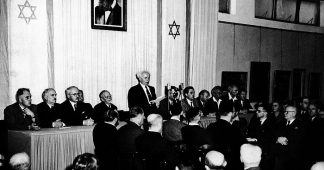By David North
4 July 2020
Today marks the 244th anniversary of the public proclamation of the Declaration of Independence, on July 4, 1776, which established the United States of America. By the time the Declaration was issued, the American colonists—and especially those of Massachusetts—had already been at war with the immensely powerful military forces of Great Britain for 15 months. Though the final decision for independence had not yet been taken, the drafting of a Declaration was assigned on June 11 by the Continental Congress, assembled in Philadelphia, to a Committee of Five. It consisted of Benjamin Franklin of Pennsylvania, John Adams of Massachusetts, Thomas Jefferson of Virginia, Robert Livingston of New York, and Roger Sherman of Connecticut.
After agreeing on an outline of the document, the Committee decided that the first draft should be written by the 33-year-old Tom Jefferson, whose exceptional intellect and remarkable literary gifts were already widely recognized. On June 28, he completed his draft, which was then reviewed by members of the Congress. Various changes were made in the course of the editing process. The most substantial change was the removal of Jefferson’s indictment of Great Britain for having imposed slavery on the colonies. On July 2, 1776, the Continental Congress adopted a resolution that authorized the break with Great Britain. Two days later, on July 4, it approved the final draft of the Declaration of Independence.
The immediate political consequence of the document—the formal break with Britain and the initiation of a full-scale war to secure the independence of the United States—was, in itself, sufficient to impart to the Declaration immense and enduring historical significance. But it is not only the direct political impact of the document but, rather, the principles it proclaimed that determined the world historical stature of the Declaration.
The document begins with the words, “When in the course of human events, it becomes necessary for one people to dissolve the political bands which have connected them with another…” What these words meant was that governments, and the political and social relations upon which they were based and which they defended, were not timeless and unalterable. They were the creation of men, not God. This assertion exploded the essential justification, sanctified by religion, for monarchy, aristocracy, i.e., for all forms of political power based on obscurantist veneration of bloodlines. What was created by man could be changed by man.
The Declaration then proceeded to a remarkable assertion: “We hold these truths to be self-evident, that all men are created equal, that they are endowed by their Creator with certain unalienable Rights, that among these are Life, Liberty and the pursuit of Happiness.”
In a strictly empirical sense, there was nothing “self-evident”—that is, so obviously true that it hardly required further argument—about any of these “truths.” Reality, as it was to be observed in every part of the world, including the colonies, contradicted what the Declaration claimed to be “self-evident.”
In the world of the late eighteenth century, most human beings were treated like beasts of burden, if not worse. Where in the world did existing conditions substantiate the claim that all of humanity had been “created equal”? The monarchies and aristocracies were based on the unchallengeable legitimacy of inherent inequality. The place of people in society, even where there had been a slow erosion of feudal relations, was a manifestation of a divine design.
Where was “Life,” for the great mass of people, honored and protected? In advanced Britain, children as young as six could be hanged for pick-pocketing a wealthy person’s handkerchief. The great mass of people lived in wretched poverty, enforced by strict relations of feudal and semi-feudal hierarchy. There was little “Happiness” in the lives of the general population, let alone for the millions throughout the world and in the Americas who were enslaved and hardly considered to be human.
The “truths” invoked by Jefferson were not “self-evident” in a crudely empirical sense. They were, rather, “truths” that were obtained through the application of scientific thought, i.e., Reason, as it had developed under the influence of the physicist Isaac Newton, materialist thinkers such as John Locke, and the great French philosophes of the Enlightenment, to the study of history and human society. It was the application of Reason that determined what was, and was not, politically legitimate. It was science, not the irrational and unsubstantiated invocations of a divine order, that determined what must be. It was in this profound sense that the equality of man and the “unalienable Rights” to “Life, Liberty and the Pursuit of Happiness” were “self-evident.”
Jefferson and his comrades in arms were well aware that empirically existing political and social conditions did not conform to the “self-evident Truths” asserted in the Declaration. From this fact, the following conclusion was drawn: Governments derive their “just powers from the consent of the governed.” Therefore, “whenever any Form of Government becomes destructive of these ends, it is the Right of the People to alter or abolish it, and to institute new Government, laying its foundation on such principles and organizing its powers in such form, as to them shall seem most likely to effect their Safety and Happiness.”
Thus, the Declaration of Independence proclaimed revolution to be a legitimate and even necessary means of removing from power governments that had become oppressive and injurious to the “Happiness” of the people. Jefferson adhered to this principle and displayed not the slightest squeamishness when the masses of France, inspired by American Revolution, took bloody vengeance against King Louis XVI and the aristocracy. Louis, declared Jefferson, ought to be punished “like other criminals.” Rather than witness the defeat of the French Revolution, Jefferson wrote to a friend, “I would have seen half the earth desolated. Were there but an Adam and an Eve left in every country, and left free, it would be better than as it is now.” He expressed unmitigated joy at the prospect of the revolution’s victory, which would “bring at length kings, nobles and priests to the scaffolds which they have been so long deluging with human blood.”
It is, of course, an undeniable historical fact that Jefferson’s personal ownership of slaves and his compromises with slavery represent the great irony and even tragedy of his life. They were the expression in his personal biography of the existing social conditions and contradictions of the world into which he was born—a world in which slavery, serfdom, and numerous forms of indentured servitude flourished and whose legitimacy was hardly questioned. No doubt, the moralizing philistines of academia will continue to condemn Jefferson. But their condemnations do not alter by one iota the revolutionary impact of the Declaration of the Independence.
The American Revolution of 1775–83 did not solve the problem of slavery. This is not because the solution was blocked by Jefferson or other revolutionary leaders, like Washington, who owned slaves. The incomplete character of the first stage of the American bourgeois democratic revolution was determined by the existing objective conditions—and not simply those that existed in North America. Mankind, as Marx was later to explain, “always sets itself only such tasks as it can solve; since, looking at the matter more closely, we will always find that the task itself arises only when the material conditions necessary for its solution already exist or are at least in the process of formation.” The conditions for a decisive settlement with slavery did not yet exist. That still required several decades of industrial development and the emergence of an economically powerful capitalist class in the North. Moreover, that class had to develop a democratic political movement capable of mobilizing masses and sustaining a long and bitter civil war.
This essential social and economic process unfolded rapidly in the decades that followed the American Revolution. The capitalist development of the North became increasingly incompatible with the political domination of the United States by the Slave Power. This objective incompatibility found its ideological expression in the ever more intense awareness that the ideals of human equality proclaimed in the Declaration of Independence could not be reconciled with the horrifying reality of slavery.
However, it must be stressed that the process of historical causation that led up to the Civil War was not driven in a one-sided manner by socioeconomic factors, with the ideological conflicts a mere reflection of the former. The influence exerted by the principles articulated in the Declaration played an immense, almost independent, role in influencing mass political consciousness in the North and preparing it for an intransigent struggle against the Slave Power.
Abraham Lincoln’s intellectual and political development epitomized the influence exerted by Thomas Jefferson and the Declaration that he authored. Again and again, in numerous speeches, Lincoln invoked the political legacy of Jefferson. For example, in a letter written in 1859, Lincoln stated:
“All honor to Jefferson—to the man who, in the concrete pressure of a struggle for national independence by a single people, had the coolness, forecast, and capacity to introduce into a merely revolutionary document, an abstract truth, and so to embalm it there, that today and in all coming days, it shall be a rebuke and a stumbling block to the very harbingers of reappearing tyranny and oppression.”
Following his election to the presidency in 1860, Lincoln declared: “I have never had a feeling politically that did not spring from the sentiments embodied in the Declaration of Independence.”
And on his way to Washington to assume the presidency, Lincoln explained:
“It [the Revolution] was not the mere matter of separation of the colonies from the motherland, but [of] that sentiment in the Declaration of Independence, which gave liberty not alone to the people of this country, but hope to all the world, for all future time. It was that which gave promise that in due time the weights would be lifted from the shoulders of all men, and that all should have an equal chance. This is the sentiment embodied in the Declaration of Independence.”
Jefferson was the author of the great revolutionary manifesto that provided the ideological inspiration for the Civil War. Under Lincoln’s leadership, the Union armies—which ultimately mobilized and armed tens of thousands of slaves in struggle against the Confederacy—destroyed slavery.
Of course, the United States that emerged from the Civil War soon betrayed the promises of democracy and equality that Lincoln had made. The “new birth of freedom” gave way to the imperatives of modern capitalism. A new form of social struggle, between an emerging working class and an industrial bourgeoisie, came to dominate the political and social landscape. In this new class struggle, the northern bourgeoisie saw the benefit of an alliance with the remnants of the old slave-owning class. Reconstruction was brought to an end. Racism was incited and utilized as a potent weapon against the unity of the working class.
Intransigent opposition to this specific form of political reaction became a central task of the working class in the fight for socialism. Only though the establishment of workers’ power, the ending of capitalism, and the building of a socialist society on a world scale can the scourge of racism and all forms of social oppression be overcome. And in this fight, the words and deeds of both Jefferson and Lincoln will continue to inspire. All that was historically progressive in their lifework lives on in the modern socialist movement.











